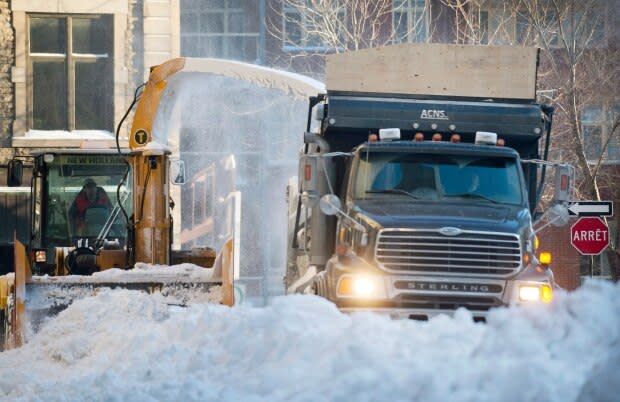Montreal's new 'proactive' snow-clearing plan comes without big budget boost
Montreal Mayor Valérie Plante is promising a series of new, "proactive" measures to help manage ice and snow this winter, but those measures aren't backed by a substantially larger budget.
The city has earmarked $166.4 million for the coming winter — $3.1 million more than it budgeted last year.
That increase is enough to cover the cost of inflation, but even if if it had been in the budget last year, it wouldn't have been enough to cover the costs of de-icing and clearing snow, since Montreal went about $6 million over budget in 2018–2019. The year before that, the city's snow-clearing budget was $20 million in the red.
"We are adapting constantly," Plante said at a news conference Monday.
After two seasons loaded with citizen complaints and budget shortfalls, the mayor said this year's plan has been in the making for a year, and the city is ready for the coming season with fresh, innovative ways to keep streets and sidewalks safe and snow-free.
For starters, she said the city has added 33 new trailers to its fleet for spreading melting agents and abrasives on sidewalks.
There will also be 600 observation points to measure the thickness of ice left behind after snow-removal or de-icing operations.

A "mobility squad" will be out ensuring foot and vehicle traffic is flowing smoothly, mainly around Metro stations, in reserved bus lanes and on sidewalks that have been designated as priorities.
Montreal has also added 15 new weather-monitoring stations — bringing the total up to 25 — so as to better gauge weather conditions and plan operations accordingly, Plante said. The stations will operate in tandem with Environment Canada forecasts.
Boroughs to have more flexibility, mayor says
The city is giving boroughs more "flexibility" when it comes to managing snow, Plante said.
Each of the 19 boroughs will have the power to trigger two local snow-removal operations each season, because snow conditions can vary from one borough to the next.
Each borough has received an additional budgetary allocation to pay for the removal of snow from the homes of citizens with reduced mobility. This operation is being conducted in collaboration with local organizations.
The city will continue to operate services such as its Info-Neige app which lets residents know where snow-removal operations are taking place.
And drones will again be flown over snow dumps to ensure space is being optimized, said Coun. Jean-François Parenteau, who is the executive committee member responsible for citizen services.
"All these innovations will allow us to be more agile and provide the safest possible network for pedestrians and road users," Parenteau said in a statement.
The city will continue to monitor the situation and adjust as needed, he said.
No more room for error: Opposition

The Plante administration has had two difficult years when it comes to managing snow operations, said opposition leader Lionel Perez in response to Plante's announcement.
"They've made a lot of mistakes — a lot of errors — and all we have heard are excuses over the last two years," he said, vowing to keep a close eye on snow operations across the city.
For example, last February, Ensemble Montréal's motion to prohibit contractors from leaving piles of snow at street corners was rejected by the Projet Montréal majority, he said.
The motion was aimed at helping people with reduced mobility navigate the city, he said.
Perez also slammed the Projet Montréal administration for failing to substantially increase the budget, given that last year's was insufficient and the city will likely face a greater number of major snowfalls than in the past, he said.
"Yet they're not increasing the budget. We think it's a mistake. It's a poor way to manage public funds," he said.
Covering extra expenses with reserve funds or surpluses is not "the right way to go about it," Perez said.


